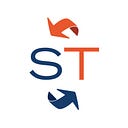A new way of training and recruiting that’s disrupting the UK’s tech sector
50 applications, burritos, and five new Code Academy Graduates
By Luke Hennerley, Lead Application Manager at Sidetrade and Mark Sheldon, CTO at Sidetrade.
Coding bootcamps in the UK are a good thing, but they’re not perfect. I’ve always believed — as someone who’s been an apprentice with Microsoft, and spent my career in R&D — that the coding bootcamp model needs some disruption.
Could courses be done faster than the usual three to four months? Do they need to cost as much as degree fees? Can training and jobs be better linked? How can the tech industry use coding courses to boost diversity?
Winning the battle of technology talents
On the 14th October 2019 we launched the first official Code Academy at AI firm Sidetrade in Birmingham, UK.
Thanks to a great team of experienced tech pros, and a pilot done in 2018, we completely re-thought the content and delivery. It was a demanding four weeks for us and the students, but that’s what we wanted.
Day One started with us defining our goals. We had the ambitious aim of turning every student into a ‘full stack ninja.’ What is a full stack ninja, you ask? Well, for the 2019 academy, it looked a little something like this…
We wanted to make this a lot more immersive and interactive, with new, and clearer vision before the members kicked-off their own project.
This meant we would spend our days on-site doing lots of programming training, rather than discussing theoretical material — all of which we put together right here in the Birmingham R&D team, combining the best resources available, our own unique content, and our combined years of experience in tech.
The initial skillsets of students varied from zero programming experience, right up to students holding computer science degrees. You see, we welcomed candidates who didn’t have computing degrees but could demonstrate interest and potential.
By the end of the bootcamp, all members succeeded in the following:
- Becoming familiar with Git
- Set up VSCode for .NET & Web development
- Loaded a relational data set through pgAdmin (CSV)
- Learnt how to write TSQL to analyse and find trends within a data set
- Learnt about the concept of & develop a basic RESTFul service
- Introduced to angular (using http://angular.io/start)
- Were able to connect all layers of the stack
- Use Kanban (Trello) to manage projects
- How to define an MVP
These are the skills needed for today’s developer roles, but delivered in an environment which replicated how a real tech team works — daily stand-ups, teamwork around projects and learning, and support from senior staff.
What is a Demo day?
After receiving 50 applicants for this year’s Code Academy, we ended the course with eight students coming forward to present their final project using full-scale applications build from scratch, to classmates and senior Sidetraders from the UK and Paris HQ.
We’re extremely proud to say that 50% of final day presenters were women.
Sukhamrit presenting her full stack project to the group
The demo day was a chance for trainees to show their developed application, created in just 4 weeks, and a last chance to impress for the new job roles that were up for grabs at the end.
Each trainee was set the challenge of building the front and back end stack for an e-commerce shop, explaining what they did and why, then taking questions from the audience and assessors.
We welcomed special guests, including Mark Sheldon (Chief Technology Officer) and Frederic Dupont (Chief Services Officer) to hear from the next generation of engineers, and see them in action.
How to start a strong career in AI Tech
We’re pleased to announce that there have been FIVE (rather than four) recruits — the quality of the trainees was so good we had to create an additional role to match the talent before us. Here’s just a few:
- Ben, 30, application engineer with the R&D team. He graduated with a sports science degree and subsequently worked in the technical ceramics industry for eight years, then took the plunge with this massive career change.
- Jack, 22, application engineer with the R&D team. He graduated with a degree in computer science and spent three years working as pub barman. This will be his first role in the industry.
- Sukhamrit, 28 yrs old, SQL engineer with the Professional Services team. She completed degrees in IT, computer science, and software development in India and Australia, before coming to the UK to be with her husband. The Code Academy was her first taste of training and work since arriving.
New hires Ben and Tash
I’m proud to say that the three people we hired last year -during the pilot- are all still with us and doing amazingly well in their technical abilities and are on course for a promising future in tech.
If you’re part of a tech or HR team facing the challenge of hiring the right people for tech roles, feel free to have a read of an in-depth interview I did with the Training Journal. I think it’ll be useful in terms of the business case and nuts and bolts of how to replicate what we’ve done at Sidetrade. It’s time to disrupt the education space and hire the future generation of engineers in a new way.
